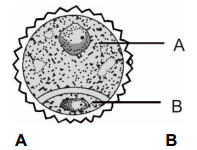A typical anther is
(a) Tetrasporangiate
(b) Tetragonal
(c) Trilobed
(d) Surrounded by four wall layers
The correct ones are
1. Only (a), (b) and (d)
2. Only (a) and (d)
3. Only (b) and (c)
4. All (a), (b), (c) and (d)
The anther wall layer which is usually polyploid and has dense cytoplasm as well as high DNA content is
1. Endothelium
2. Tapetum
3. Epidermis
4. Middle layer
Complete the below given schematic representation by choosing the correct option.

A B C
1. Mitosis Microspore tetrad Meiosis
2. Mitosis Pollen grain Meiosis
3. Meiosis Pollen Syngamy
4. Meiosis Pollen grain Mitosis
Mark the wrongly matched pair
1. Amaranthus - Causes pollen allergy
2. Pollen banks - Store pollen at -196°C
3. Pea - Pollens are viable for only 30 minutes
4. Pollen grains - Rich in nutrients
In the following figure identify the parts labeled as A and B and select the option stating true features of them.

A B
1. Forms gametes Smaller in size
2. Stores food reserve Irregular shaped nucleus
3. Irregular shaped nucleus Spindle-shaped cell
4. Bigger in size Forms female gametes
Mark the wrong statement regarding egg apparatus
1. It is seven celled
2. It is found at the micropylar end of the ovule
3. Its cells are haploid
4. It contains single egg cell
In an embryo sac, the cells that degenerate after
fertilisation are
(1) Synergids and primary endosperm cell
(2) Synergids and antipodals
(3) Antipodals and primary endosperm cell
(4) Egg and antipodals
Largest cell in embryo sac of angiosperm is
1. Synergid cell
2. Egg
3. Antipodal cell
4. Central cell
The entry of pollen tube into the embryosac takes place due to the chemo-attractant secreted by
1. Tapetum
2. Oosphere
3. Filiform apparatus
4. Antipodal
Select the option in which both organisms cannot complete their life cycle without each other
1. Snake – Santalum
2. Ficus – Bats
3. Moth – Yucca
4. Aquilegia – Amorphophallus






